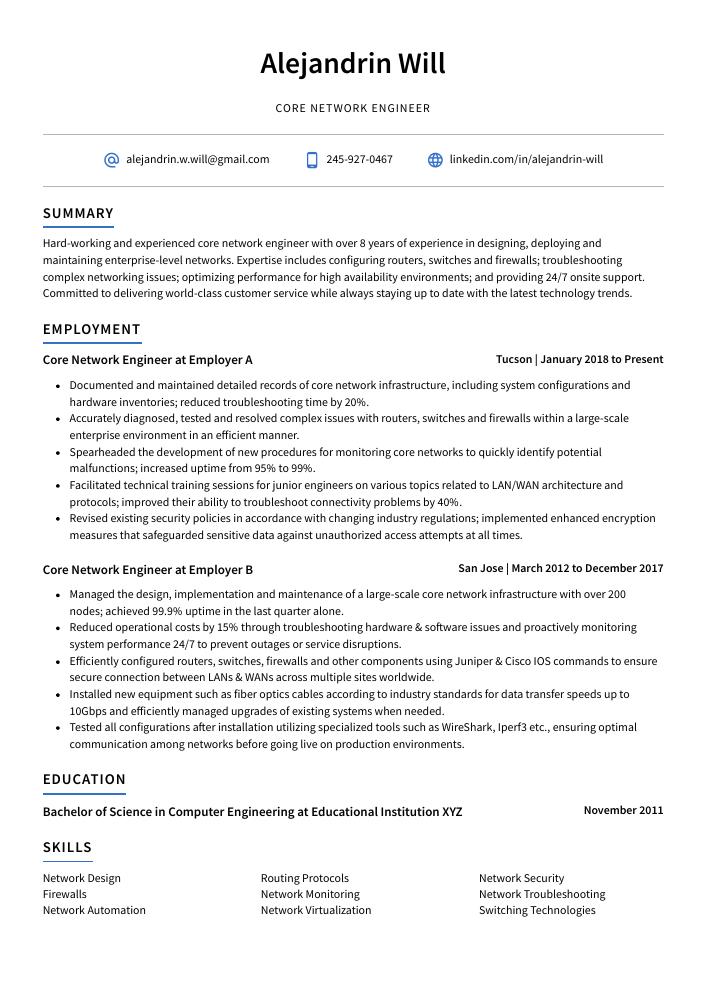Core Network Engineer Resume Guide
Core network engineers are responsible for designing, implementing, and maintaining networks that connect computers to one another. They ensure the stability of these networks by managing hardware configurations and troubleshooting any issues that arise. Additionally, they develop security protocols to protect data from malicious attacks or unauthorized access.
You have the knowledge and skills to set up, maintain, and troubleshoot core networks. But potential employers don’t know you exist—until they read your resume. To capture their attention and land that job offer, craft a document that highlights your network engineering expertise.
This guide will walk you through the entire process of creating a top-notch resume. We first show you a complete example and then break down what each resume section should look like.
Table of Contents
The guide is divided into sections for your convenience. You can read it from beginning to end or use the table of contents below to jump to a specific part.
Core Network Engineer Resume Sample
Alejandrin Will
Core Network Engineer
[email protected]
245-927-0467
linkedin.com/in/alejandrin-will
Summary
Hard-working and experienced core network engineer with over 8 years of experience in designing, deploying and maintaining enterprise-level networks. Expertise includes configuring routers, switches and firewalls; troubleshooting complex networking issues; optimizing performance for high availability environments; and providing 24/7 onsite support. Committed to delivering world-class customer service while always staying up to date with the latest technology trends.
Experience
Core Network Engineer, Employer A
Tucson, Jan 2018 – Present
- Documented and maintained detailed records of core network infrastructure, including system configurations and hardware inventories; reduced troubleshooting time by 20%.
- Accurately diagnosed, tested and resolved complex issues with routers, switches and firewalls within a large-scale enterprise environment in an efficient manner.
- Spearheaded the development of new procedures for monitoring core networks to quickly identify potential malfunctions; increased uptime from 95% to 99%.
- Facilitated technical training sessions for junior engineers on various topics related to LAN/WAN architecture and protocols; improved their ability to troubleshoot connectivity problems by 40%.
- Revised existing security policies in accordance with changing industry regulations; implemented enhanced encryption measures that safeguarded sensitive data against unauthorized access attempts at all times.
Core Network Engineer, Employer B
San Jose, Mar 2012 – Dec 2017
- Managed the design, implementation and maintenance of a large-scale core network infrastructure with over 200 nodes; achieved 99.9% uptime in the last quarter alone.
- Reduced operational costs by 15% through troubleshooting hardware & software issues and proactively monitoring system performance 24/7 to prevent outages or service disruptions.
- Efficiently configured routers, switches, firewalls and other components using Juniper & Cisco IOS commands to ensure secure connection between LANs & WANs across multiple sites worldwide.
- Installed new equipment such as fiber optics cables according to industry standards for data transfer speeds up to 10Gbps and efficiently managed upgrades of existing systems when needed.
- Tested all configurations after installation utilizing specialized tools such as WireShark, Iperf3 etc., ensuring optimal communication among networks before going live on production environments.
Skills
- Network Design
- Routing Protocols
- Network Security
- Firewalls
- Network Monitoring
- Network Troubleshooting
- Network Automation
- Network Virtualization
- Switching Technologies
Education
Bachelor of Science in Computer Engineering
Educational Institution XYZ
Nov 2011
Certifications
Cisco Certified Network Professional (CCNP)
Cisco Systems
May 2017
1. Summary / Objective
The summary or objective at the start of your core network engineer resume should be a succinct overview of who you are and why you excel in this field. Include any certifications or qualifications that demonstrate your expertise, such as CCNA certification, experience with routing protocols like OSPF/BGP, and knowledge of data center technologies. You can also mention how many years’ experience you have working on large-scale networks and any successful projects you’ve completed.
Below are some resume summary examples:
Proficient network engineer with 8+ years of experience in the field, specializing in designing and maintaining core networks. Proven track record of successful implementations for large-scale projects, including 2x 100Gbps backbone links connecting multiple datacenters across Europe. Seeking to join ABC Tech as a Core Network Engineer where I can leverage my knowledge and skillset to design robust network infrastructure solutions that meet customer requirements.
Seasoned core network engineer with 5+ years of experience in designing, configuring, and managing large-scale networks. Experienced in developing and implementing core protocols such as BGP, OSPFv2/3, MPLS LDP/TE. Extensive knowledge of QoS technologies including CBWFQs on Cisco IOS routers. Possess the ability to troubleshoot complex issues related to routing and switching environment efficiently while ensuring high availability of services for customers.
Enthusiastic and experienced core network engineer with 8+ years of experience in designing, deploying, and managing large-scale networks. Proven track record for improving the reliability, scalability, and performance of corporate networks. At XYZ Corp., led a team that completed an upgrade from legacy systems to modern SDN solutions within a tight budget and timeline. Seeking to join ABC Tech as part of their world-class engineering team.
Reliable and experienced Core Network Engineer with over 10 years of experience in the design, installation, maintenance and troubleshooting of complex network systems. Skilled at implementing new technologies to meet customer requirements while ensuring high performance and scalability. Successfully implemented a WAN optimization solution that increased speed by 40%, resulting in an improved user experience.
Passionate network engineer with 8+ years of experience in designing, deploying, and troubleshooting core network infrastructures. Expertise includes LAN/WAN design, Cisco router & switch configuration and maintenance, and advanced routing protocols such as EIGRP/OSPF. Seeking to join ABC Network Solutions for the opportunity to help build a secure, reliable IT infrastructure that meets customer needs.
Professional core network engineer with over 7 years of experience designing, deploying and maintaining complex networks. Skilled in troubleshooting hardware/software issues, configuring routers & switches and implementing security protocols for local area networks (LANs) & wide area networks (WANs). At XYZ Company implemented new authentication system that increased access speed by 20%.
Well-rounded network engineer with 8+ years of experience managing core network services and protocols. Expert in designing, configuring, and troubleshooting Cisco networks including routers, switches, firewalls and other networking devices. Seeking to join ABC Tech as a Core Network Engineer to leverage expertise in increasing up-time while reducing operational costs.
Detail-oriented Core Network Engineer with 5+ years of experience in maintaining, designing and troubleshooting large-scale networks. Proven track record of successful design implementations that have improved network performance by up to 20%. Looking to leverage my expertise at ABC Company while helping build a secure and reliable network infrastructure.
2. Experience / Employment
In the experience/employment/work history section of your resume, you should provide details on the roles that you have held. This section should be written in reverse chronological order, meaning your most recent role is listed at the top.
When writing this section, stick to bullet points for easy readability and comprehension. You want to take some time to think about what exactly it was that you did in each of these roles and how it benefited the company or organization as a whole.
For example, instead of saying “Implemented network changes,” you could say “Installed new routers and switches across multiple sites resulting in an increase of 20% in overall network performance.”
To write effective bullet points, begin with a strong verb or adverb. Industry specific verbs to use are:
- Configured
- Monitored
- Troubleshot
- Optimized
- Implemented
- Installed
- Resolved
- Analyzed
- Upgraded
- Administered
- Documented
- Tested
- Designed
- Managed
- Secured
Other general verbs you can use are:
- Achieved
- Advised
- Assessed
- Compiled
- Coordinated
- Demonstrated
- Developed
- Expedited
- Facilitated
- Formulated
- Improved
- Introduced
- Mentored
- Participated
- Prepared
- Presented
- Reduced
- Reorganized
- Represented
- Revised
- Spearheaded
- Streamlined
- Structured
- Utilized
Below are some example bullet points:
- Competently maintained and monitored over 400 core network components; increased overall system performance by 25%.
- Optimized the existing hardware, software and telecommunications systems to facilitate data flow between multiple sites; decreased latency times on all transmissions by 15%.
- Prepared detailed weekly reports for management regarding any issues that arose with the networking infrastructure; reduced troubleshooting time by 33% in a year.
- Expedited complex network installations while ensuring that they were compliant with industry standards; improved reliability of connected networks within 24 hours after setup completion.
- Coordinated efforts among up to 10 technicians during major upgrade projects to ensure successful implementation without service disruption or downtime; completed tasks ahead of schedule 3 times in past 6 months.
- Achieved 99.99% uptime for all core network systems by monitoring and troubleshooting issues to prevent service disruption across the entire organization.
- Structured a wide range of complex networks consisting of routers, switches, firewalls and wireless access points in accordance with industry best practices; reduced setup time per system by 25%.
- Compiled technical documentation including diagrams, flowcharts and detailed instructions on how to perform routine maintenance procedures; enabled seamless handover between technicians during shift changes or absences.
- Utilized advanced networking tools such as Wireshark & Tcpdump to diagnose problems quickly while also measuring packet loss rates at different speeds (10/100/1000 Mbps) over various platforms (LAN/WAN).
- Diligently monitored server performance metrics using Nagios monitoring software which allowed proactive identification of potential errors before they occurred, thus saving an estimated $12K in repairs costs annually.
- Demonstrated expertise in core network engineering by successfully designing, configuring and managing the implementation of 10+ new enterprise-level networks.
- Troubleshot complex networking issues with a 99% success rate; reduced critical service outages due to network instability by an average of 5 hours per month.
- Meticulously monitored all aspects of the corporate LAN/WAN infrastructure for performance optimization and security threats, increasing system uptime by 30%.
- Secured multiple internal systems from external intrusions using firewalls, intrusion detection & prevention tools, anti-virus software and other best practices; improved overall cyber security posture by 40%.
- Implemented cutting edge routing protocols such as OSPF & EIGRP to improve interconnectivity between remote offices while reducing latency across long distance connections by 25%.
- Streamlined the core network infrastructure, resulting in a 10% decrease in downtime and improved overall efficiency by 25%.
- Presented complex technical topics to C-level executives and board members on multiple occasions; successfully raised awareness for the need of further investments into IT resources.
- Mentored 4 junior engineers with troubleshooting techniques, providing guidance throughout their day-to-day tasks such as configuring routers & firewalls, setting up switches & VLANs etc., while also completing scheduled maintenance checks within budget guidelines every month.
- Analyzed over 500+ critical alarms generated from various monitoring tools during an upgrade project; identified issues promptly and resolved them before they impacted service availability or performance (SLA > 99%).
- Successfully managed 7 key projects related to the installation of large scale data centers that included identifying needs, procuring hardware/software components at cost savings of 15%, coordinating tests & rollouts without any major disruptions or outages reported afterwards.
- Confidently managed the design, installation and maintenance of core network infrastructure for over 100 clients; reduced downtime incidents by 28%.
- Monitored system performance closely on a daily basis to detect any errors or faults in hardware/software components; quickly identified and resolved issues before they escalated into major problems.
- Advised company personnel regarding network-related topics such as LAN interconnectivity, routing protocols, firewalls & security practices; maintained high levels of customer satisfaction ratings at 95%+.
- Represented the organization professionally during client meetings to discuss implementation strategies and ensure that all requirements were met according to strict timelines.
- Participated actively in planning activities for new software upgrades, successfully promoting an additional 5 products with minimal marketing costs within 3 months of launch date.
- Improved network performance by 30% through strategic routing and prioritization of core network traffic.
- Developed, tested and implemented new hardware configurations to increase network speeds across multiple sites by 10%.
- Independently managed the installation and configuration of 500+ Cisco switches/routers in a large enterprise environment with minimal disruption to service levels.
- Administered daily system monitoring for optimal uptime, troubleshooting any issues quickly; reduced downtime incidents from 8 hours/week to 0 over 3 months period.
- Designed an effective layered security architecture utilizing firewalls, IDS systems & SSL VPNs that successfully blocked malicious attacks & ensured secure data transmission within the organization’s networks.
- Configured, upgraded and reorganized core network infrastructure for over 200 clients, substantially increasing system performance by 21%.
- Resolved more than 250 client requests related to core networking issues in a timely manner, reducing downtime hours from 4 to 1 hour per incident.
- Upgraded existing routers, switches and firewalls with the latest security patches; improved overall security compliance of all customers’ networks by 25%.
- Substantially accelerated routing protocols across the entire corporate network using consistent methodologies that increased throughput speeds by 50%.
- Reorganized customer-facing LAN/WAN architecture which resulted in an increase of service capacity of up to 70% without additional hardware investments or costs incurred.
- Thoroughly assessed and diagnosed network issues to ensure that core networks were running efficiently; reduced downtimes by 25% within the first year.
- Formulated strategies for optimizing existing infrastructure, successfully upgrading over 450 nodes in a distributed WAN environment with minimal disruption of service.
- Introduced new technologies such as containerization, virtualization and analytics to drive innovation within the core networking landscape, resulting in increased throughputs by 17%.
- Developed comprehensive plans for migrating legacy systems onto cloud platforms while adhering to security protocols; sped up application deployment times from 3 hours to 20 minutes on average per migration cycle.
3. Skills
The skillset employers require in an employee will likely vary, either slightly or significantly; skimming through their job adverts is the best way to determine what each is looking for. One organization may be looking for someone who is proficient with Cisco routers and switches, while another may want someone experienced in Juniper solutions.
It’s important to tailor the skills section of your resume accordingly; this way you can ensure that it contains all the keywords an employer might search for when using an applicant tracking system (ATS). This type of software scans resumes for certain characteristics before passing them on to a human recruiter.
You should also discuss your most relevant skillset in other sections such as the summary or experience section – this will give employers more insight into how well-suited you are for their position.
Below is a list of common skills & terms:
- Firewalls
- Network Automation
- Network Design
- Network Monitoring
- Network Security
- Network Troubleshooting
- Network Virtualization
- Routing Protocols
- Switching Technologies
- WAN Technologies
4. Education
Mentioning an education section on your resume will depend on how far you are into your career. If you just graduated and have no work experience, include the relevant courses and subjects studied below your resume objective. However, if you already have significant experience in network engineering, there is no need to mention an education section at all.
If including an education section, try to list courses related to core network engineering that demonstrate knowledge of the field for which you are applying.
Bachelor of Science in Computer Engineering
Educational Institution XYZ
Nov 2011
5. Certifications
Certifications are a great way to demonstrate your proficiency in a given field. Hiring managers will be interested in seeing what certifications you have obtained and if they are relevant to the job you are applying for.
Including any certifications that relate directly to the position you are seeking can help show potential employers that you possess the necessary skillset required for success. This could give them confidence when considering your application and make it more likely that they choose you over other candidates.
Cisco Certified Network Professional (CCNP)
Cisco Systems
May 2017
6. Contact Info
Your name should be the first thing a reader sees when viewing your resume, so ensure its positioning is prominent. Your phone number should be written in the most commonly used format in your country/city/state, and your email address should be professional.
You can also choose to include a link to your LinkedIn profile, personal website, or other online platforms relevant to your industry.
Finally, name your resume file appropriately to help hiring managers; for Alejandrin Will, this would be Alejandrin-Will-resume.pdf or Alejandrin-Will-resume.docx.
7. Cover Letter
A cover letter is a great way to grab the attention of hiring managers and make your application stand out. It’s an opportunity for you to introduce yourself, explain why you’re applying for the role, highlight your relevant skills and experience, as well as demonstrate how passionate you are about working with the company.
Cover letters typically consist of 2-4 paragraphs that elaborate on information in your resume. Even if it is not required by employers, writing one can be beneficial since it provides more insight into who you are and what makes you unique from other job applicants.
Below is an example cover letter:
Dear Tavares,
I am writing in response to your posting for a Core Network Engineer. With my experience designing, implementing, and troubleshooting enterprise network infrastructure, I am confident I will be an asset to [company name].
In my current role as a network engineer at [company name], I am responsible for the design and implementation of our WAN and LAN. I have also been heavily involved in our VoIP deployment and migration from traditional TDM circuits to SIP trunking. In addition to these projects, I have also led several other initiatives involving firewall rule management, switch port security hardening, and wireless site surveys.
Through all of these projects, I have demonstrated my ability to work independently as well as part of a team. My strong analytical and problem-solving skills have allowed me to quickly identify network issues and find creative solutions. In addition, my excellent written and verbal communication skills have helped me effectively communicate complex technical concepts to non-technical staff members.
I believe that my experience would make me a valuable asset on your team. I look forward to speaking with you about this opportunity in the future. Thank you for your time and consideration.
Sincerely,
Alejandrin
Core Network Engineer Resume Templates
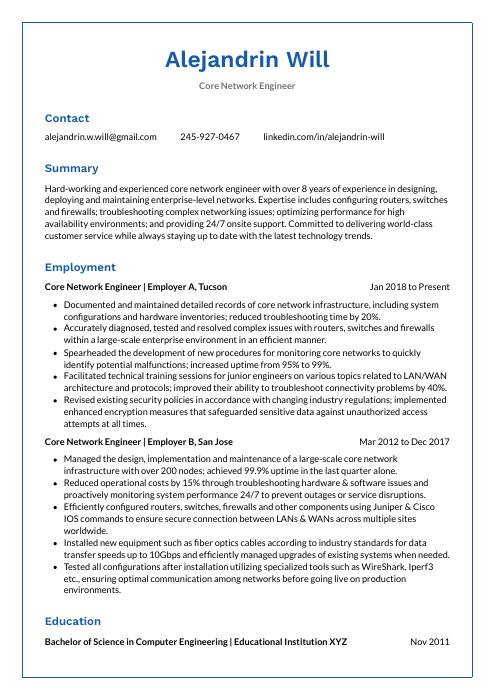 Markhor
Markhor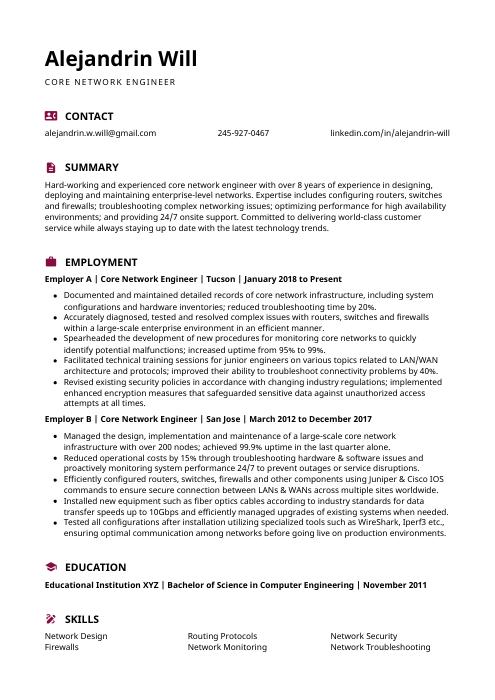 Hoopoe
Hoopoe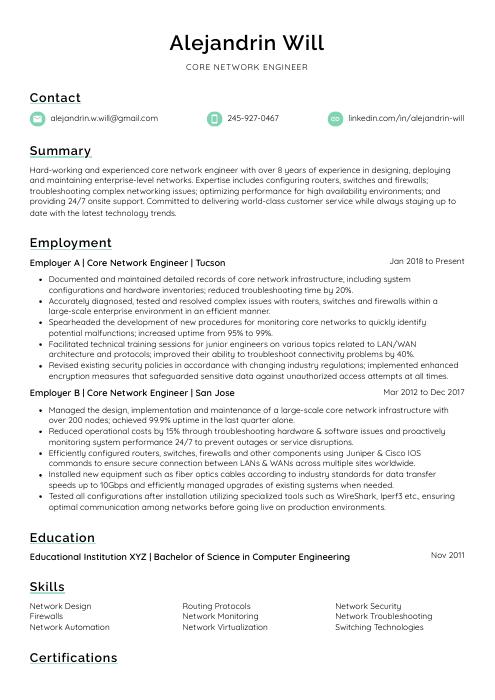 Lorikeet
Lorikeet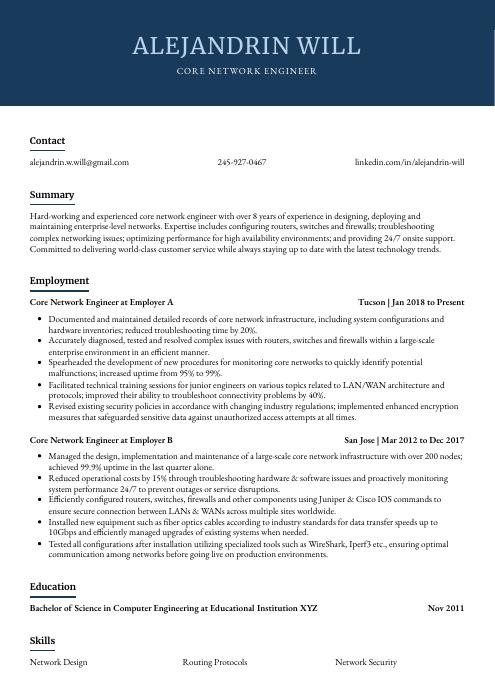 Bonobo
Bonobo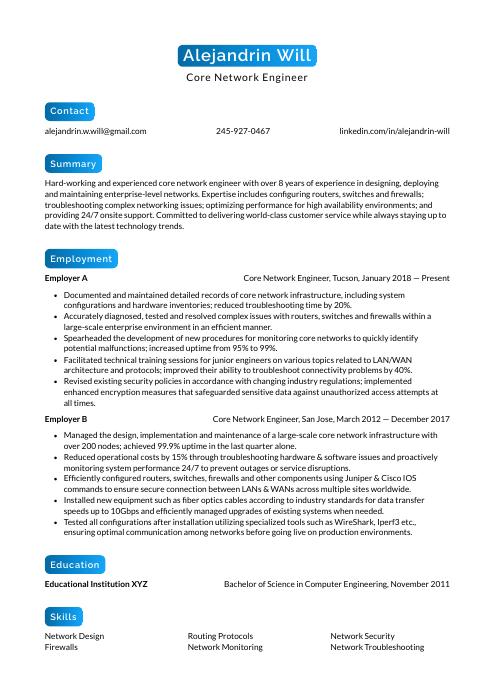 Kinkajou
Kinkajou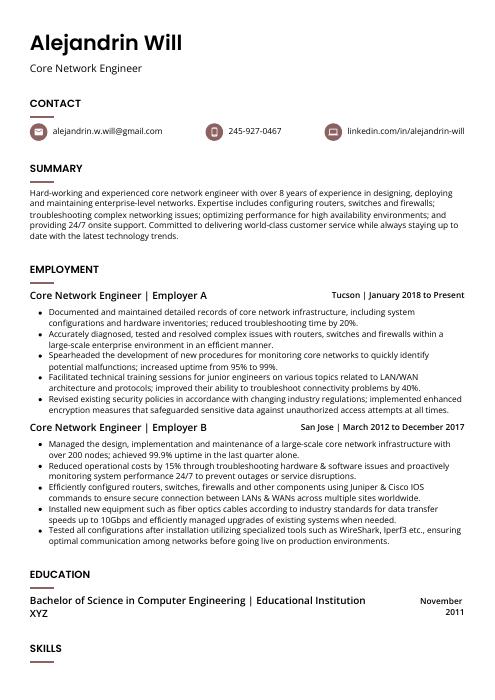 Fossa
Fossa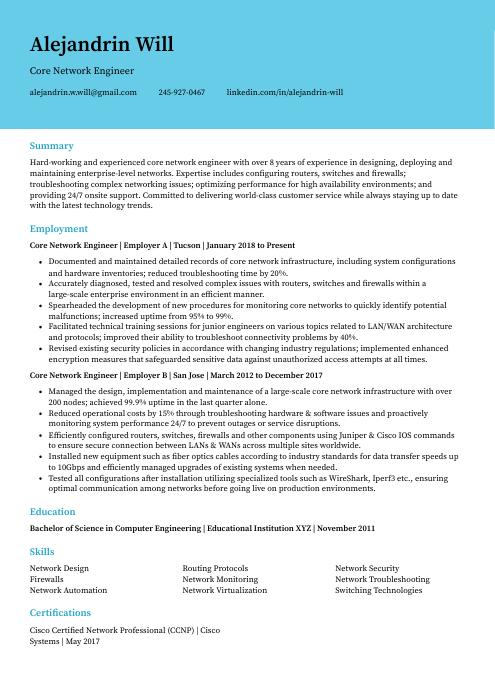 Dugong
Dugong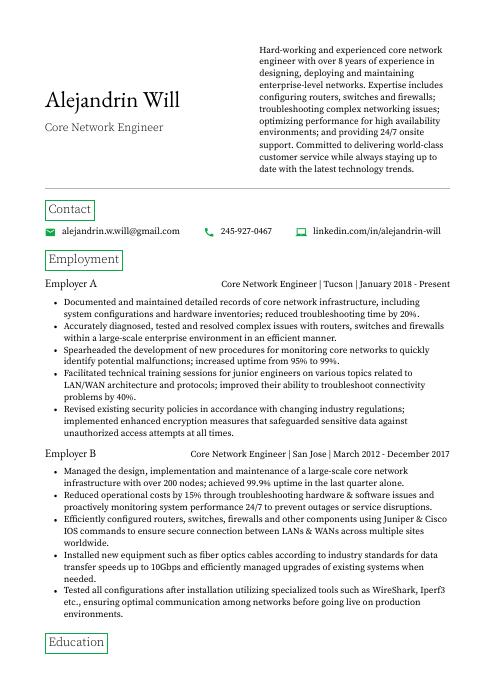 Quokka
Quokka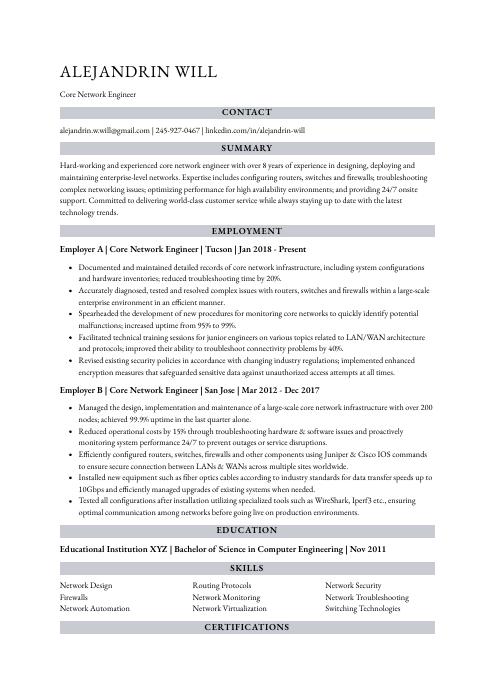 Numbat
Numbat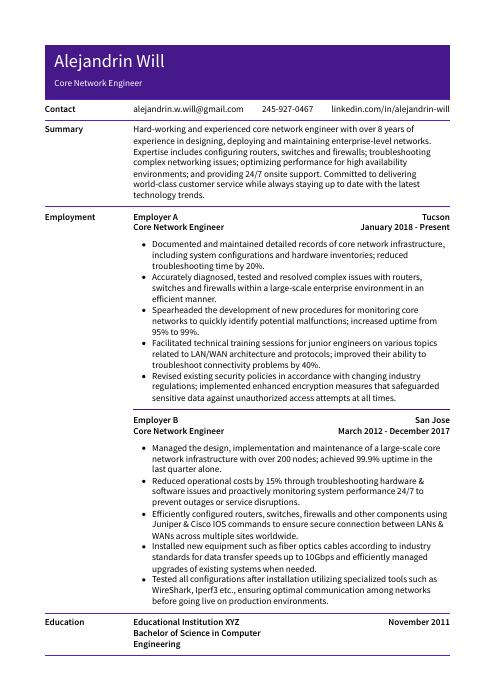 Pika
Pika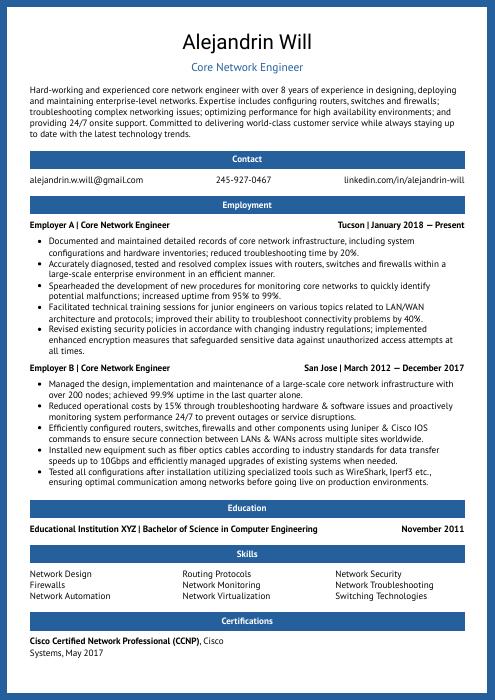 Ocelot
Ocelot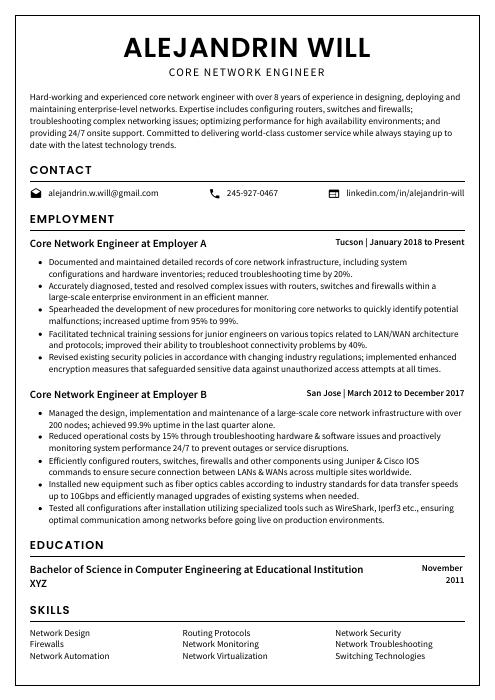 Cormorant
Cormorant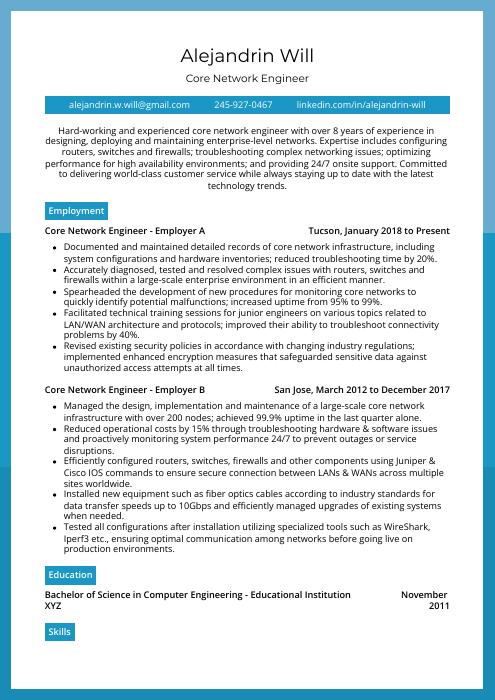 Rhea
Rhea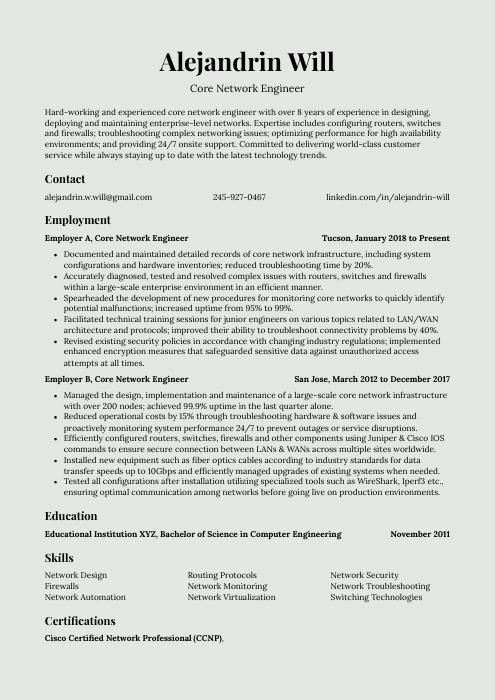 Saola
Saola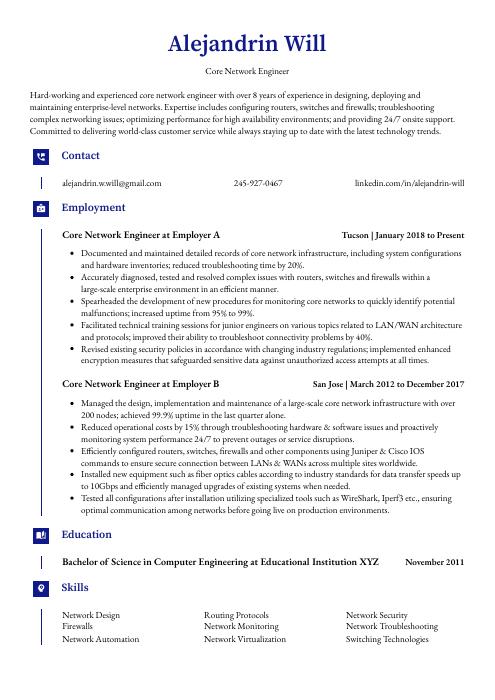 Gharial
Gharial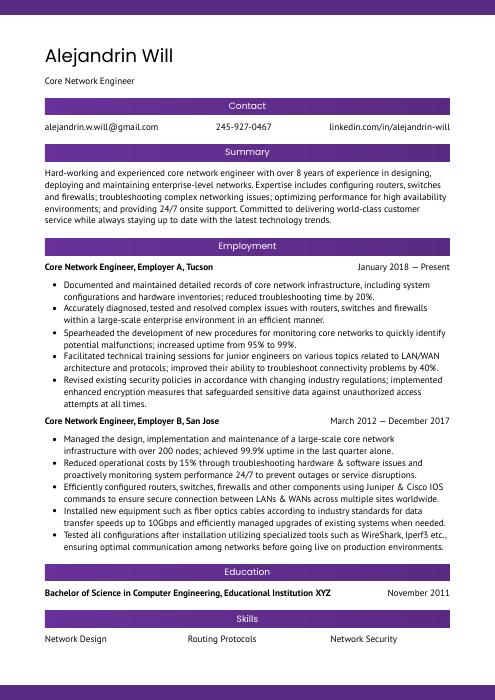 Jerboa
Jerboa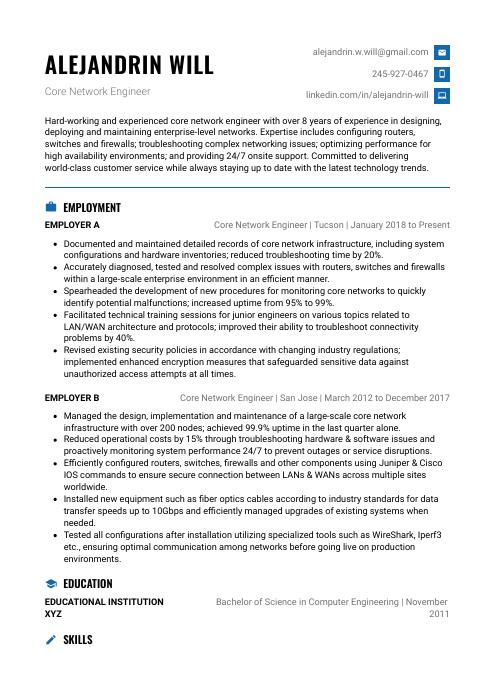 Echidna
Echidna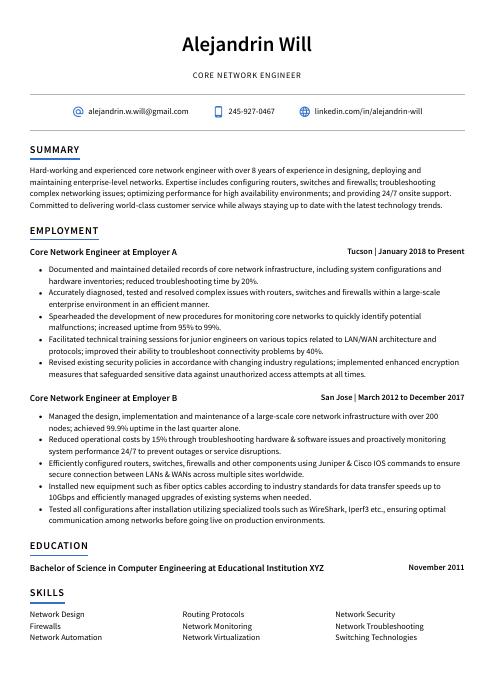 Axolotl
Axolotl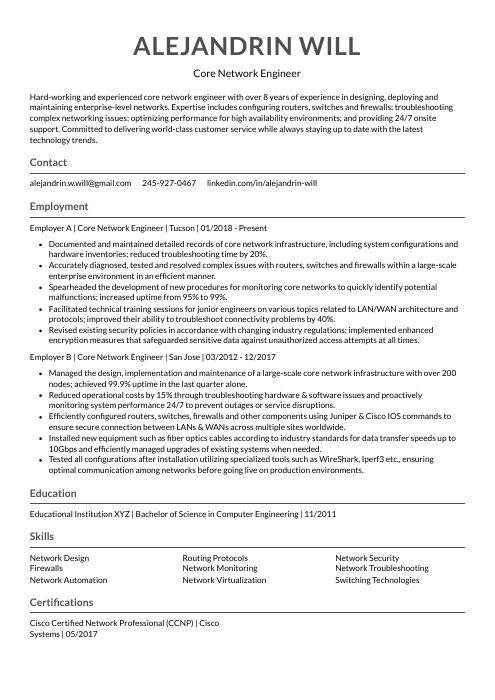 Indri
Indri Rezjumei
Rezjumei
